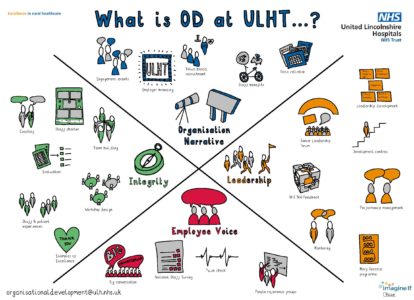To be able to support our staff and the organisation as a whole, we need to provide opportunities for growth and development. For an organisation as big as ULHT it’s important for all staff, both clinical and non-clinical, to be given the best possible chance to further their career.
The organisational development team are there to help. Let’s take a look at what they do. The team work in a range of areas to help develop staff at all levels and in all roles:
Organisational narrative
- Engagement events – providing an opportunity to engage with the wider organisation, share information and gain feedback.
- Data collation – measuring progress and outcomes of development at organisation and team level.
- Staff benefits – a range of benefits for our workforce to benefit from.
- Employer branding – encouraging job seekers to come and work for ULHT, clarity on what it is like to work here and why choose us over another organisation.
- Value-based recruitment – building strong links with the HR recruitment team to ensure those that join our organisation hold the organisation’s values throughout their work.
Leadership
- Senior leadership forum – an opportunity for senior leaders to get together, network and develop a clear picture of what leadership looks like at ULHT and support us all in our leadership roles.
- Leadership development – A mix of modular, 90 minute face-to-face workshops that can build into a complete programme, these workshops centre on the application of the topic with the aim to solve problems or work through specific tasks.
- Development centres – providing staff with an opportunity to learn more about being a leader, what areas they excel in and what current strengths they could build on.
- NHS 360 feedback – A development tool and personalised feedback session to help employees gain insight into how others perceive them and have an opportunity to adjust behaviours and develop skills that will enable them to excel at their jobs.
- Performance management – Appraisals and regular check-ins with managers for all staff.
- Mentoring – A mentor shares his/her knowledge, skills, experience, and/or expertise to enable the individual, as mentee, to undertake or progress an aspect of learning to achieve personal/professional development.
- Mary Seacole – to develop knowledge and skills in leadership and management for aspiring First Time Leaders supporting the Lincolnshire Sustainability and Transformation Plan (STP).
Employee voice
- Big conversations – Interactive quarterly sessions held on each site to seek the views of the organisation on 2021 strategy topics.
- National Staff Survey – Annual survey undertaken nationally to seek the views of the organisation for morale and satisfaction at work.
- Pulse Check – A ‘check in’ following the National Staff Survey to ensure the actions taken are effective.
- People reference groups – Advising on the ‘people’ element of the organisation to influence each of the 2021 programmes.
Integrity
- Team building – Working with your team to understand how you work and developing bespoke interventions to develop and build on this, helping teams to be the best they can be.
- Staff charter – Provide clarity of ‘what we expect to see from staff’ and what ‘staff can expect from the Trust’ as an employer, describing how together we will deliver our vision and values for all our patients.
- Coaching – Confidential one-to-one relationship in which an individual uses the skills of a coach to work through issues in a structured way to find an outcome or solution. It is a protected, non-judgmental relationship, which facilitates a wide range of learning, experimentation and development. It is built on mutual regard, trust and respect.
- Evaluation – understanding what the different data that is gathered is telling us and the effectiveness of our work.
- Workshop design – creating different ways to learn and develop across the organisation, using the various skills of the organisational development team.
- Staff and patient experience – linking the two areas that have a real impact on each other and understanding what we can learn from this and do differently. This collaboration is at the beginning stages and very exciting to be part of.
- Examples of Excellence – A personalised, professional certificate of recognition, an easy way to say thank you and recognising good practice.
